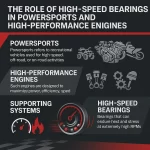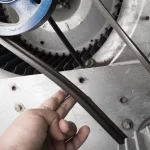To help ensure a machinery operates to its fullest potential, components must move in harmonious precision. This is why lubrication emerges as the most significant factor, since the benefits of lubrication go beyond the properties of friction reduction. Proper lubrication is the linchpin for ensuring longevity, efficiency, and reliability of the bearings and the machinery. Let’s elaborate on the various benefits of using good quality bearing lubrication.
Does Lubrication Prevent Wear and Tear?
Yes. Lubrication is a vital element of bearing health, as it ensures the extended longevity of the crucial components in a bearing. A good lubricant will create a protective film that delicately envelops the various bearing components. This protective film mitigates
- Direct metal-to-metal contact that leads to wear and tear of the components
- Friction that leads to component malfunction and overheating
For example: Imagine if there is no lubricant in a ball bearing assembly. In its absence, these tiny spheres would end up engaging in a harsh, metal-on-metal interaction that will wear down over time and compromise overall efficiency of the system. Lubrication steps in to turn this chaos into order, creating a buffer that transforms this abrasive dance into a seamless waltz, preserving the integrity of the bearings.
How Does Lubrication Impact Bearing Longevity?
Lubrication and bearing shelf life are directly related. Adequate lubrication fosters a conducive environment for smooth and uninterrupted bearing operation. This enhanced durability translates into an extended lifespan for the bearings, ensuring they perform at their peak for an extended period.
For example: Consider a high-speed train hurtling down the tracks. The bearings supporting the wheels are constantly subjected to intense forces. With proper lubrication, these bearings endure the journey, demonstrating resilience and ensuring the train reaches its destination safely. The longevity of these bearings, sustained by effective lubrication, becomes paramount for the reliability of the entire transportation system.
How Does Friction Impact Bearing Performance?
Friction is the biggest enemy for any good machinery. Over time it is the only thing that can impede optimal performance and efficiency of the machinery and its components. Lubrication steps in to create a barrier against the unruly impact of friction on the components. This ensures bearings operate seamlessly, under substantial loads, with consistent overall system efficiency.
For example: Picture a conveyor belt tirelessly carrying heavy loads in a manufacturing facility. The bearings supporting this conveyor face constant friction and stress. Lubrication acts allows the conveyor to move with grace and efficiency, contributing to the overall productivity of the manufacturing process.
What is the Role of Lubrication in Temperature Regulation?
Efficient lubrication plays a crucial role in the regulation of temperature within bearings. As components move in tandem, heat is generated, and without proper dissipation, it can lead to thermal damage. Lubrication acts as a thermal conductor, facilitating the transfer of heat away from critical bearing surfaces.
For example: Think of an industrial setting with heavy machinery operating at full tilt. Without adequate lubrication, the bearings in these machines would succumb to the heat generated, leading to a breakdown. Lubrication ensures that the heat generated is conducted away, preventing excessive temperature rise and maintaining the bearings’ operational integrity.
How Does Lubrication Shield Against Contamination?
In the industrial landscape, bearings operate in highly testing environments. The surroundings are often rife with contaminants like dust, debris, and moisture. Some operate in high temperatures, others in damp environments. Lubrication builds a protective barrier that seals bearings from external impurities. This translates to a clean and contamination-free environment, ideal for long lasting bearings.
For example: Imagine a heavy-duty crane operating in a construction site. Dust and debris are omnipresent in such environments. Lubrication prevents these external elements from infiltrating the bearings, ensuring smooth operation and preventing premature wear.
How Does Lubrication Protect Against Corrosive Elements?
For bearings exposed to corrosive environments, the threat of degradation and premature failure looms large. Here also lubrication builds the resilience of bearing surfaces against the corrosive forces at play.
For example: Consider bearings in offshore drilling equipment exposed to saltwater. Without proper lubrication, these bearings would succumb to corrosion, jeopardizing the entire operation. Lubrication ensures the bearings withstand the corrosive onslaught and maintain their functionality.
Can Lubricants Ensure Cost Savings in the Long Run?
Through reduced need for maintenance, proper lubrication is nothing short of an investment. Good quality lubrication will ensure long-term cost savings through reduced maintenance due to:
- Minimized wear and tear,
- Reduced frequency of maintenance interventions.
This translates into substantial cost savings, making proper lubrication a wise and economical investment.
For example: Imagine an assembly line in a manufacturing plant. Without proper lubrication, the bearings supporting the machinery would wear out quickly. This means frequent breakdowns and costly maintenance. With effective lubrication, there is no need for constant interventions, resulting in significant cost savings over the operational life of the machinery.
In Conclusion
Proper bearing lubrication extends far beyond the realm of friction reduction. As machinery evolves, understanding and implementing effective lubrication practices become imperative for industries aiming to achieve optimal performance, reliability, and cost efficiency. Lubrication, in all its nuanced glory, is the silent architect of a machinery symphony where each component moves in orchestrated unity, ensuring the longevity and efficiency of the entire system.
FAQ's
How does bearing lubrication impact efficiency?
Proper lubrication reduces friction between bearing components, enhancing efficiency by ensuring smooth operation and minimizing wear.
What types of lubricants are commonly used for bearings?
Common lubricants include grease and oil. The choice depends on factors like load, speed, and environmental conditions.
How often should bearings be lubricated?
The frequency of lubrication varies based on factors such as operating conditions and type of bearing. Regular maintenance schedules should be followed.
Can over-lubrication be detrimental to bearings?
Yes, over-lubrication can lead to increased heat, energy consumption, and premature bearing failure. It’s essential to follow manufacturer guidelines for the correct amount of lubrication.
What are the consequences of under-lubrication?
Under-lubrication can result in increased friction, heat, and wear, leading to premature bearing failure. Regular monitoring and proper lubrication are crucial for optimal performance.
Can bearing lubrication impact noise levels in machinery?
Yes, effective lubrication reduces friction-induced noise in bearings, contributing to quieter machinery operation.



















